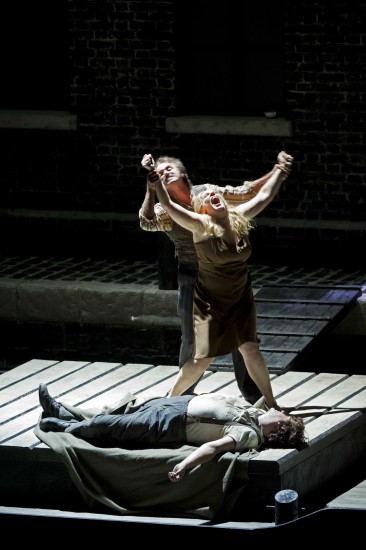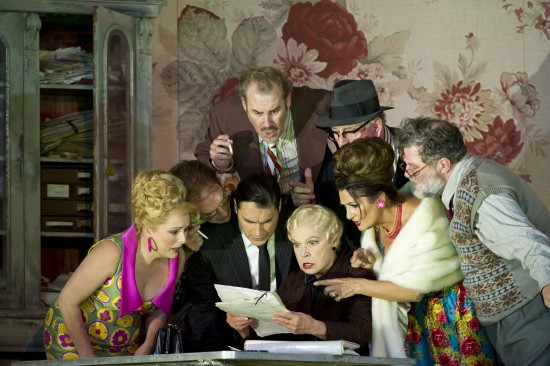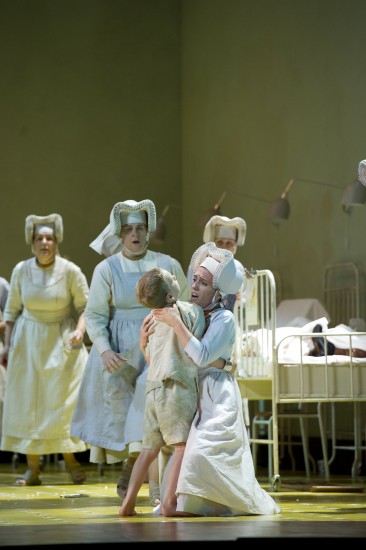On Sunday, February 5, 2012, and again on Tuesday I saw my second complete Il Trittico and I was reinforced in two of my opinions. One, that Puccini’s three one-acts are even better taken as a whole, and two, that an ROH production with Conductor Antonio Pappano and Stage Director Richard Jones will be first rate.
I’ll be honest with you. Taken by itself, I don’t really like Il Tabarro. I’m sure that it is verismo to the nth degree in its depiction of life on a canal boat in the Seine – but that’s not my own personal verismo. That being said, Trittico Uno is a perfect gem. The story is not pretty, the characters are not pretty, the music is not pretty. But each of story, characters, and music matches the other parts perfectly, and the whole builds to its grisly end with mounting tension. All of this is perfectly captured by Pappano and Jones and singers Lucio Gallo, Eva-Maria Westbroek, and Aleksandrs Antonenko.

Captain Michelle (Lucio Gallo) forces his wife Giorgetta (Eva-Maria Westbroek) down onto the dead body of her lover Luigi (Aleksandrs Antonenko)
The curtain comes down, and I can breathe again. But only briefly because there is no intermission between the first two parts. The curtain goes up and my first reaction is kudos to D. M. Wood, lighting designer. All of Il Tabarro was played in semidarkness which emphasized the darkness of the story – and suddenly the stage is brilliantly lit; the contrast almost hurts the eyes.
In all previous productions of Suor Angelica that I have seen, the setting has been an outdoor area of a convent. Which works fine. But Jones has set his scene in the children’s ward of a nun’s hospital. Various activities are going on and from time to time it focuses on a particular nun seated on a lab stool and grinding herbs with a mortar and pestle. And whenever the conversation or action refers to young children or joining the convent or on desire, this nun’s face tightens in misery and her herb-grinding is energized with a repressed vicious energy.
This nun is, of course Sister Angelica, and she is showing us clearly and uncontrollably that she longs for her son – the illegitimate baby she bore seven years ago and has neither seen, heard from, or had news of since he was torn away from her minutes after his birth. For Angelica was the elder daughter of a prince and the son’s father was a mere commoner; the conception was a bitter disgrace for the whole family. The instant the infant was born the mother was whisked away to a convent, never to be spoken of or spoken to again.
I have never, ever, seen an opera singer who so completely lived a fictional character as Ermonela Jaho lived Sister Angelica. The opening scene described above was just the start. A bit later, Angelica’s aunt, the Princess (Anna Larsson) visits to demand that Angelica sign away her financial birth-right in favor of her younger sister. Angelica has no objection to doing that; in fact for a moment she forgets her own grief and rejoices over the fact that her little sister is getting married. But first, “Tell me of my son.” Auntie demurs: “You’re here to atone for your sin, not to grieve.” This enrages Angelica: “I’ve happily given everything I possess to the Virgin Mary, but I cannot give her the love and yearning I feel towards my son.” Even though she is less than half as old as the Princess and not much more than half as tall, she lights into her relative with all the fury of a tigress defending her cubs. Her aunt replies without showing much feeling one way or another, “Two years ago he became very ill. We did everything we could to save him, but . . . ” Angelica gasps, “My son is dead!” and falls to the floor in a faint.
Left alone after the signing, Angelica in her faith believes that her son is now an angel in heaven and that he is listening to her every word. She sings how she has loved him and how she longs for the day that she can quit this earth and join him in heaven. “Send me a sign,” she pleads. “Write it in the stars.”
She believes she has received his message and that it said, “Do it now. You have the herbs and the knowledge. Join me today.” She rushes to her lab bench in the ward, pours some pills from one bottle, drips a few drops from a vial on each pill, and pops them one after another, each with a grimace and a swallow of water. All with a beatific smile on her face as she sings farewell to her fellow nuns “on my way to join my son in paradise.”
Suddenly she stops. Her face freezes. Slowly the radiant smile fades into sobriety, then to fear, to terror. She realizes she has just taken her own life – the worst possible sin. She is not on her way to heaven and reunion with her son, but is doomed to eternal damnation. “Forgive me Holy Virgin. Mother of all mothers, forgive me.”
If you’ve read some of my other columns, you know that in real life I’m not much of a religious believer. But when I enter an opera house I check that disbelief at the door. Angelica’s faith was totally convincing. Tears were running down my cheeks. I was right there with her, pleading her cause.
The curtain falls to thunderous applause. But the drama is not over. The stage is still in total darkness. A single spot picks up a female figure in the wings and moves with her to center stage. One would expect the figure to be Ermonela Jaho taking her well-deserved initial bows for a superlative performance – one would be wrong. Angelica is there – not Ermonela. Her body is still heaving with emotion. In the past few minutes she has learned that her son is dead, she has taken poison so she can join him in heaven, she has realized that she will go to hell instead, she has pleaded for forgiveness but has died without knowing if her plea was granted. There are no words, but her whole body motion seems to be saying, “Where am I? Is this heaven or hell? Why are all those people applauding? I’d better give them a little bow.”
She does, the spotlight winks out, and a minute later the conventional curtain call sequence begins. Chorus, minor parts in increasing order of importance, culminating in the reappearance of the star. And by now she’s regained her composure and we have a chance to applaud Ermonela Jaho.
On to Gianni Schicchi. But first, honesty impels me to point out one major thing about Suor Angelica that I did not like. In all other productions I have seen, directors have used various details to make it crystal-clear that the end is joyful. Forgiveness has been granted. Richard Jones wants us to think about it. There is no celestial light from above – there are no shooting flames from below. Angelica has realized her sin; she has made her plea to the Virgin Mary; she has died.
Sunday afternoon this bothered me. I’ve told you how I felt as the end drew near. Why did Jones feel so differently? Tuesday night I did not let myself get as emotionally involved. As a reviewer I wanted all my intellectual abilities to be super-sensitive to the finale and to answer two questions: First, was there a visual clue I had overlooked? Second, what was Puccini’s music saying – Could one legitimately find alternative interpretations?
The answer to both questions was “No!” Jones was guilty of that most cardinal sin of opera directors: the actions did not fit the music. But all else was so wonderful that I will forgive him.

Gianni Schicchi – Rinuccio has found the will; on chair Rinuccio (Francesco Demuro); standing L to R: Boy (non vocal role) Marco (Robert Poulton), La Ciesca (Marie McLaughlin), Zita (Elena Zilio), Nella (Rebecca Evans), Gherardo (Alan Oke), & Simone (Gwynne Howell)
On to Gianni Schicchi. No more taut emotions. Farewell to fear and sorrow. Farewell to spirituality. Time to relax and give those laugh muscles some exercise. The plot is simple as could be. Buoso Donati dies of old age in the first minute of the opera, surrounded by a bunch of relatives eagerly looking forward to their inheritances. But his will leaves every penny of his considerable wealth to a monastery. Relatives don’t like this idea and plot with the equally scoundrelly but more intelligent and much more likeable Gianni Schicchi to replace that will with one more favorable to them.

Reading the will; front row L to R: Nella (Rebecca Evans), Rinuccio (Francesco Demuro), Zita (Elena Zilio), La Ciesca (Marie McLaughlin), Betto Di Signa (Jeremy White); back row L to R: Gherardo (Alan Oke), Marco (Robert Poulton), & Simone (Gwynne Howell)
Lucio Gallo (we saw him earlier as Michele in Il Tabarro) stars in the title role with wonderful casting for the motley crew of relatives. Of special note are the two eldest cousins Simone (Gwynne Howell) and Zita (Elena Zilio). Love interest and some lovely singing are provided by the delightfully young Rinuccio (Francesco Demuro), the only non-venal relative and Schicchi’s daughter Lauretta (Ekaterina Siurina). Puccini’s music is delightfully light-hearted and . . .but that’s enough. This opera is to be seen and heard, not to be written about it. Go, if you get a chance.
Ciao,
Photos: © ROH 2011 / Bill Cooper
This review by Philip G Hodge appeared in sanfranciscosplash.com on February 11, 2012






